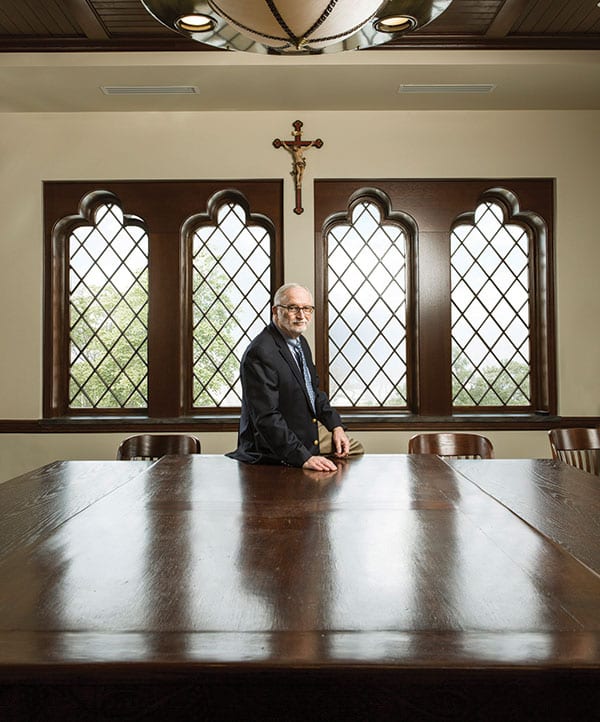May 16, 2014
Development of Western Civilization: Present at the creation

By Dr. Richard J. Grace ’62
Teaching is, in many respects, a generational thing.
Methods change, content shifts, and technologies evolve. Of the intellectual baggage transferred from one generation to another, a fair bit is jettisoned, some cases are checked and never reclaimed, and some luggage is borne on as treasure. Such has been the case with the Development of Western Civilization Program.
Tracing the program’s genealogy is easy. Our late, revered vice president of academic affairs, Paul van K. Thomson, was an undergraduate at Columbia University, where the great books program left a strong imprint on him. When he became the first director of our Honors Program in the late 1950s, his plan for a colloquium in World Civilization was built upon his Columbia experience. A decade later, with René Fortin ’55 as director, the Honors Program introduced an experiment in interdisciplinary team teaching, fusing the great books concept with a chronological narrative, running from ancient times through the 20th century.
When President William Paul Haas ’48 authorized a re-examination of the Core Curriculum in the late 1960s, the outcome was a new curriculum, centered on college-wide adoption of the Honors model.
The challenge in 1971 was to combine professors from history, literature, philosophy, and theology into teams offering lectures four days a week and conducting seminars one day a week. Each team taught two sections, with about 100 students in each lecture class and approximately 25 in each discussion group. (The Honors classes were much smaller and involved more writing but followed the same general plan.)
I was present at the creation, and I must admit that we faculty were as green as the students in many respects. One day early in the inaugural term, a young woman in the front row of our class passed out when the erudite lecturer began talking about Persian angelology. And in the first weeks of that season, we had the utopian idea that the class could read the entire Iliad and the entire Odyssey four days apart. Everyone’s endurance flagged, and we had to reduce our expectations.
For those of us committed to making the noble experiment work, DWC became a form of ongoing learning from one another. Much of my own education was achieved after I received my Ph.D. I became a very different type of historian because of my team-teaching experiences.
By the start of the 21st century, after extended deliberation, a strikingly new version of “Civ” emerged. The program continues to span four semesters, now totaling 16 hours. The new DWC involves smaller class groups, smaller teaching teams, more emphasis on seminars, and a concluding semester devoted to theme-oriented colloquia. And, after so many years of hand-me-down accommodations, Civ finally has a splendid new home in the Ruane Center. Its neighbor, the Honors Program, retains a four-semester, 20-hour curriculum for the chronological component and has an upper-level colloquium requirement.
Those of us who were “present at the creation” knew long ago that the DWC Program we assembled could not always remain as it was in 1971. It had to have room to breathe, evolve, and experiment. No doubt, many alumni will be nostalgic for their “version” of Civ, just as current students will eventually remember Civ as if it had an eternal structure. From generation to generation, the most treasured baggage will be passed on, some cases will be abandoned, and some suitcases will be put away in the attic with the memories of bygone trips.
I guess that is the way it has to be, for every Civ student knows that we cannot step into the same river twice.





